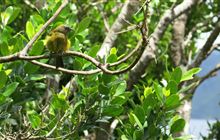Mohua breeding on Blumine Island
Archived content: This media release was accurate on the date of publication.
Introduction
We are delighted by a first sign of mohua breeding on Blumine Island/Oruawairua indicating the endangered native birds are establishing a foothold on the Marlborough Sounds' island sanctuary.Date: 09 January 2017
In a check on mohua on Blumine Island last month, DOC rangers found five pairs of mohua, three of which were raising young. One pair had two fledglings, a second pair had three fledglings and a third pair was incubating eggs.
Thirty-one mohua/yellowheads were moved to Blumine Island from Otago's Blue Mountains in Otago in 2013 with the support of Blacks Fasteners. The move aimed to establish a mohua population on the predator-free island to help ensure the survival of the species.
"It was a delight to see the fledglings at close range for a good length of time, and they were being well fed by their parents," said ranger Dan Palmer. "We saw the adults catch several large caterpillars and grubs to feed to their young ones.
"It was especially pleasing to find the nests as the year before only nine adult mohua could be found and no chicks were seen so we couldn't be sure if they were breeding.
"But we now believe they had been breeding as the male of the of the pair incubating eggs was unbanded. All the mohua moved to Blumine Island had bands put on their legs to identify them so this unbanded bird must have hatched on the island."
Mohua can be hard to find so Dan is hopeful that other birds may be present.
"The mohua on Blumine Island appear to have taken a couple of years to fully adjust and adapt to their new environment," said Dan. "Consequently, their numbers appear to have declined to start with.
"Mohua numbers on the island are still uncomfortably low putting the population at risk from threats such as a stoat getting onto the island or a storm. But knowing the mohua can breed to build up their numbers gives us encouragement they can have a secure future on Blumine Island."
Mohua are classified as nationally vulnerable, and today are only found on the mainland in beech forest south of Canterbury. Mohua have been moved to two Marlborough Sounds' island sanctuaries. There is also a breeding mohua population on Nukuwaiata, one of the Chetwode Islands.
Some of the mohua on Nukuwaiata came from a mohua population that had lived on Mt Stokes in the Marlborough Sounds until being wiped out in 2000 by rat and stoat plagues that resulted from beech masts (beech seedfall) over two consecutive years.
Contact
For media enquiries contact:
Email: media@doc.govt.nz

